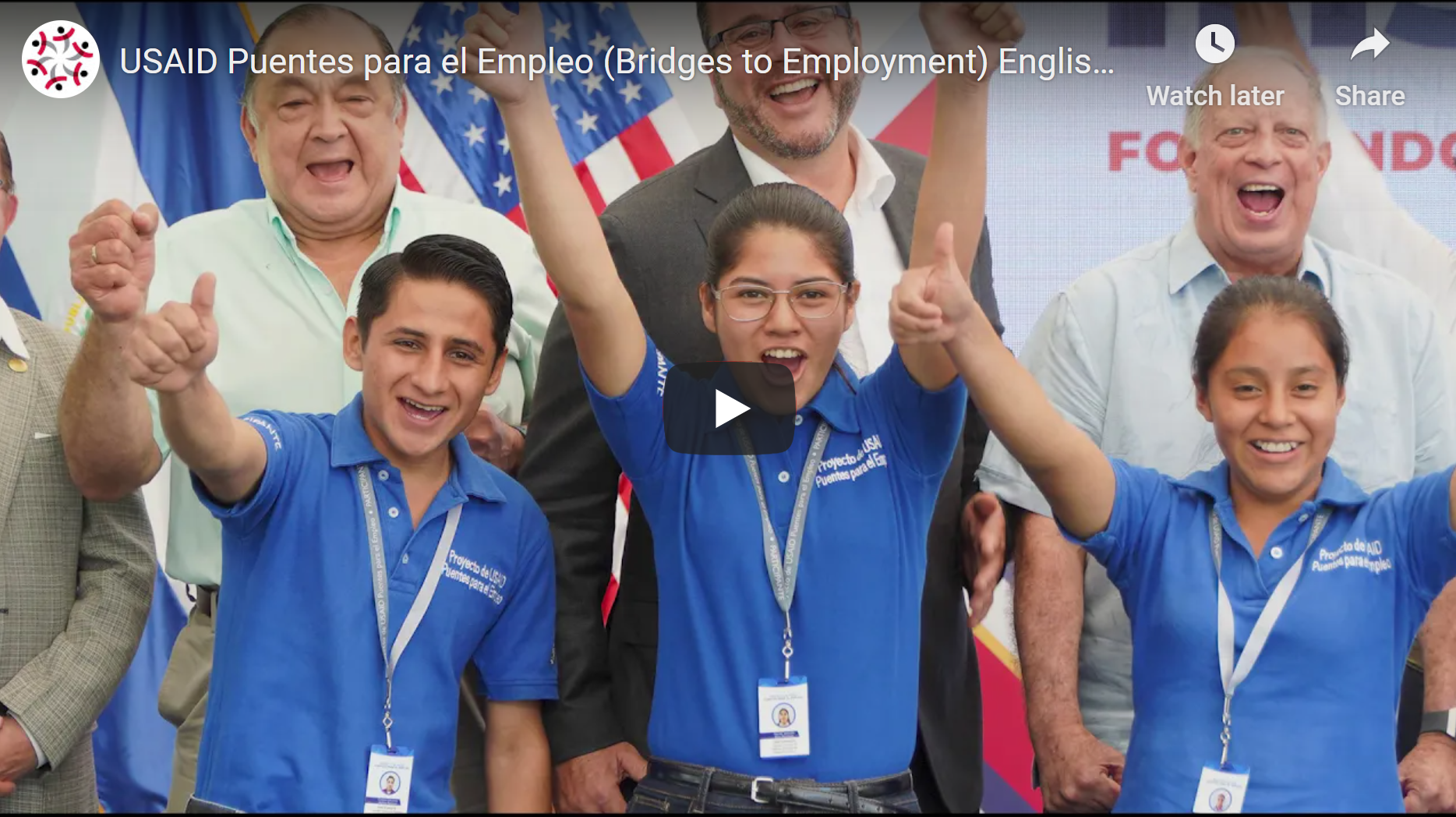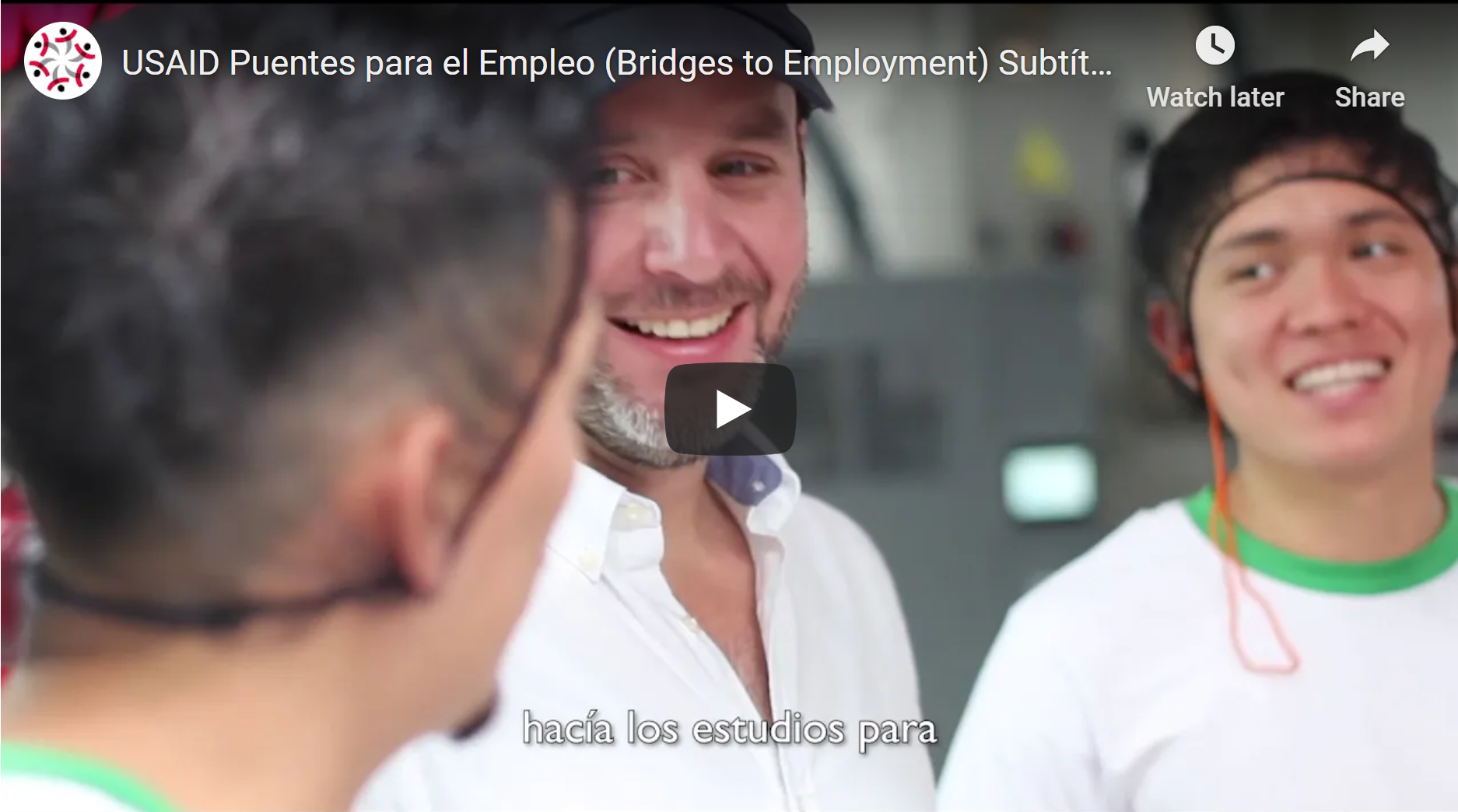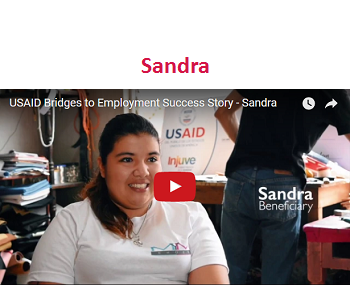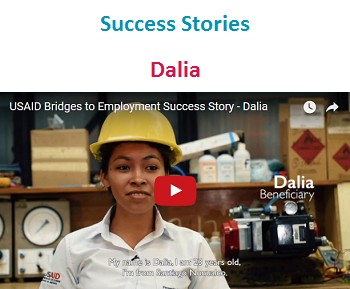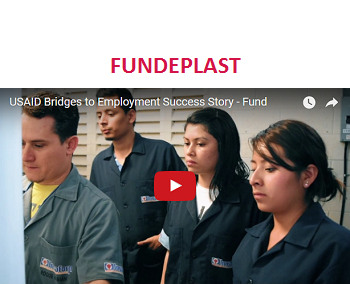
What's New
Providing Modern Machinery to Prepare Vulnerable Youth for Manufacturing Careers
Preparing Youth for Careers in El Salvador’s Tourism Industry
Building the Next Generation of El Salvador's IT Workforce
Strengthening Support for Salvadoran Youth through Local Policies
Using a Systems Approach to Ensure Life Skills Training for Youth Responds to Employers’ Needs
Three Way to Make Hiring More Inclusive of Vulnerable Youth: Lessons from El Salvador
The USAID Bridges to Employment project (Puentes) is strengthening Salvadoran workforce development institutions’ ability to provide demand-driven training, and at the same time working with employers to shift perceptions of vulnerable youth, adopt more inclusive hiring practices, and develop innovative transportation and technology solutions that overcome distance and safety barriers. More
Puentes: Bridging Gaps, Making Connections
The USAID Bridges to Employment project, is working to bridge employment and opportunity gaps in El Salvador. Over the summer, youth outreach at El Salvador’s largest annual youth event, Juventour Fair, connected Puentes with hundreds of young people to help elevate youth job skills and entrepreneurship. And in October, Puentes attended the launch of a campaign to bridge gender gaps. Moving forward, the project will help identify organizations in El Salvador that work to improve gender-related policies and practices who can apply for a gender equality seal. More
Generation Now Fest and USAID Bridges to Employment in El Salvador
Thousands of young people participated in Generation Now, the Central American Festival, which was sponsored by the United States Agency for International Development (USAID), Glasswing International, MTV Agentes de Cambio, and ItsmoFest. USAID Bridges to Employment participated with 61 volunteers – youth and staff members – who cleaned, painted murals, tables, benches, and more.
Access the full article here.
Inspiration, support, and access put El Salvadoran youth on path to success: Jonathan's story

How does a young man from Colon, one of six municipalities of El Salvador with homicide rates above the national average, avoid the gangs and violence of his neighborhood and make it to university? Jonathan says inspiration, supportive parents and teachers, and access to a scholarship made all the difference.
Read More
Prime Implementer
Implementing Partners
Plan International
JBS
Project Timeline
2015 - 2020
Project Goals
The goal of USAID Bridges to Employment is to increase and improve employment opportunities for Salvadoran youth living in high-crime municipalities. The USAID Bridges to Employment team will support USAID/El Salvador to link youth – including young women and vulnerable populations such as LGBTI and youth with disabilities – to basic social resources of work, knowledge, security, and social capital in order to foster social inclusion through employment opportunities.
Brief Background
Many young people in El Salvador’s high-crime communities face impossible choices for livelihoods - gang coercion, underemployment, and expensive, dangerous migration. At the same time, networks of committed Salvadorans are engaging youth in positive development activities to grow the country’s economy, strengthen educational systems, and offer viable alternatives to gangs and crime. These champions face epidemic violence, challenges in institutional capacity, a complex political and policy environment, and disjointed coordination at local and national levels. The result is a system that struggles to offer all Salvadoran youth positive pathways to meaningful social inclusion offered by economic stability and rewarding work.
USAID Bridges to Employment supports improvements to El Salvador’s workforce development system so that it works for all stakeholders – in particular at-risk youth – by strengthening the connections and capacity of the system at macro and institutional levels. USAID Bridges to Employment's guiding vision positions Salvadoran youth as valued, sought-after members of the national workforce, capable of critically evaluating their training and employment options and proactively pursuing job opportunities in growth sectors that are receptive to skilled recruits.
USAID Bridges to Employment's development hypothesis is that when at-risk youth have access to a high-quality, holistic, and market-relevant package of services and support that utilize and maximize their strengths, they are more likely to improve their employment situation and income. Over the long term, USAID’s coordinated investments in high-risk areas will contribute to more stable and safe communities that offer productive economic opportunities.
Overview of Activities
Objective 1: Improved Enabling Environment for Workforce Development and Employment
- Conduct policy assessment and recommend interventions
- Conduct labor market assessment
- Support Salvadoran labor market data management
- Assess youth labor employment practice in Salvadoran firms, document obstacles and propose solutions
- Provide training to Salvadoran firms in best practices for inclusive youth employment
- Design and implement a strategic communications campaign targeting youth, families, businesses, and Salvadoran public
- Work with the GOES to create a national training qualifications framework
Objective 2: Improved Quality of Workforce Development Services that effectively Respond to Market Demand to Insert At-Risk Youth into Target Economic Sectors
- Conduct a Service Provider Assessment
- Provide organizational capacity building training and technical assistance to service providers
- Develop and deliver on-the-job training programs such as internships, apprenticeships, and mentorships
- Foster business-municipal government collaboration on curriculum development.
- Improve at-risk youth workforce transition through better job placement services
Objective 3: Improved Workforce Readiness Demonstrated by Target At-Risk Youth
- Implement participatory youth assessment
- Develop and implement soft skills and life skills training curriculum
- Facilitate alliances with services providers to improve access to workforce development training for at-risk youth and basic education opportunities
- Improve access to career counseling and mentoring services for at-risk youth
- Provide material support for at-risk youth in transition to jobs
- Support youth entrepreneur initiatives
Expected Results
- Youth—including young women and vulnerable populations—linked to basic social resources of work, knowledge, security, and social capital in order to foster inclusion through employment opportunities.
- Pathways toward employment facilitated by convening Salvadoran champions for youth inclusion, optimizing their performance, linking them to one another, and linking youth to them.

